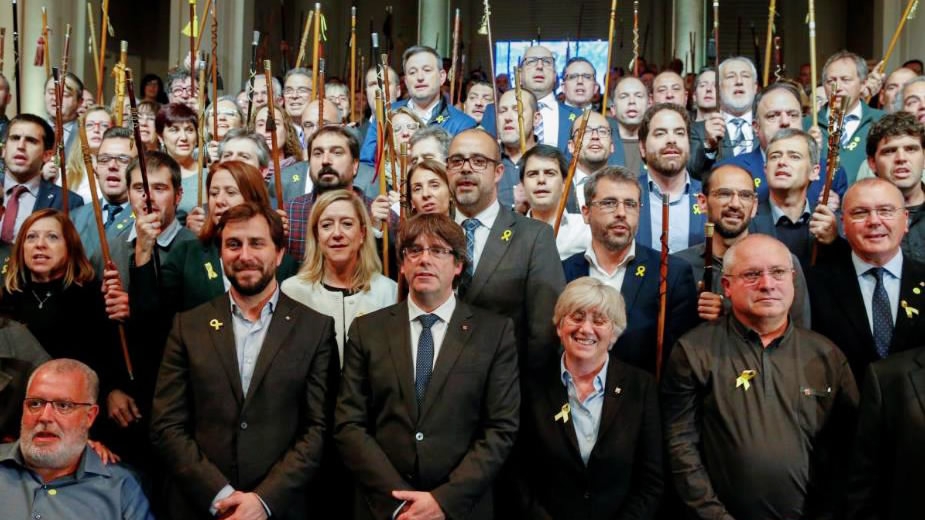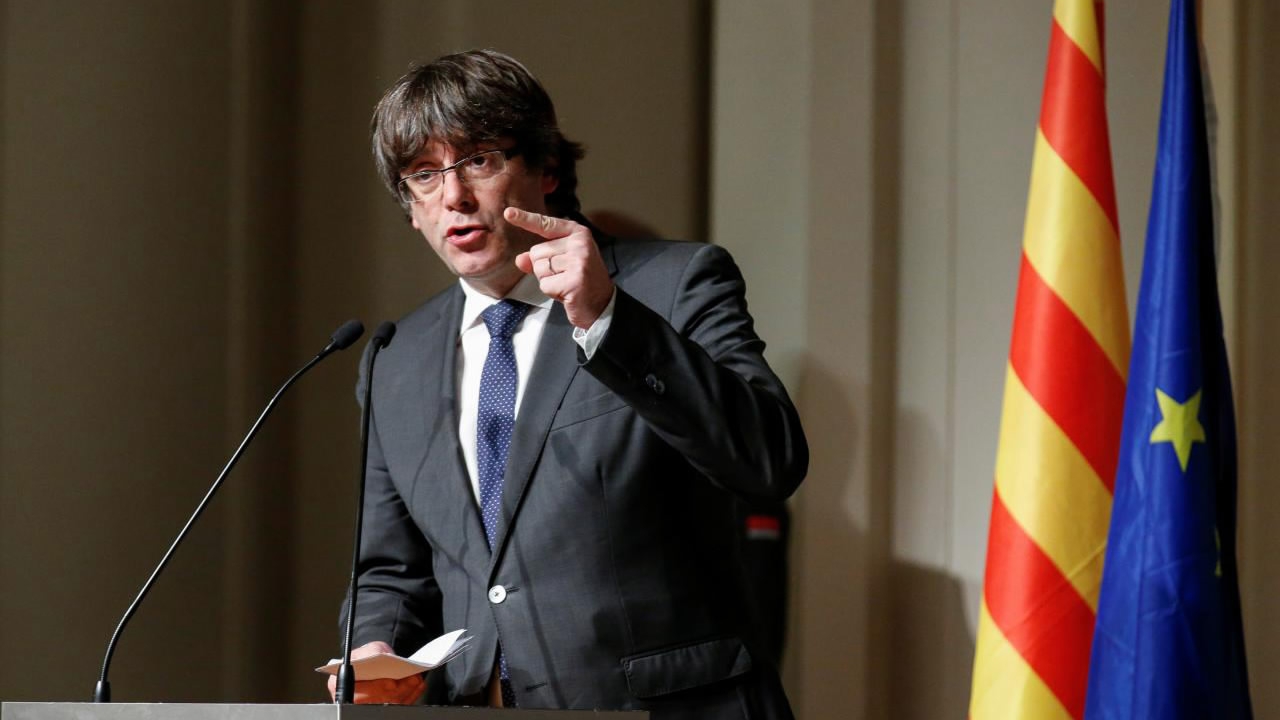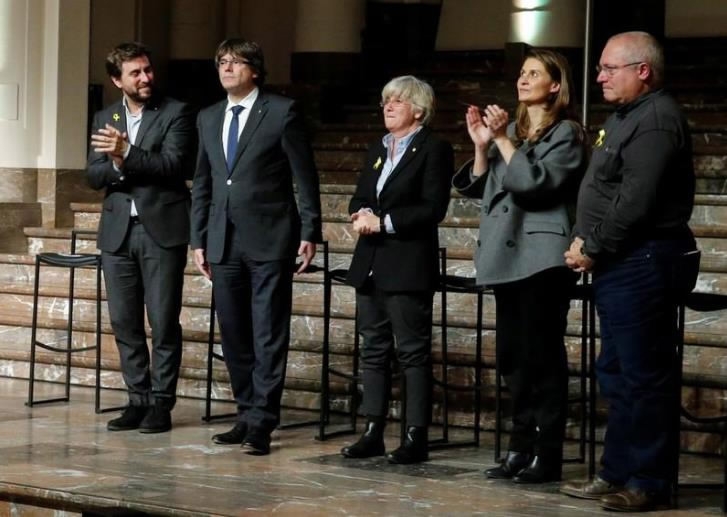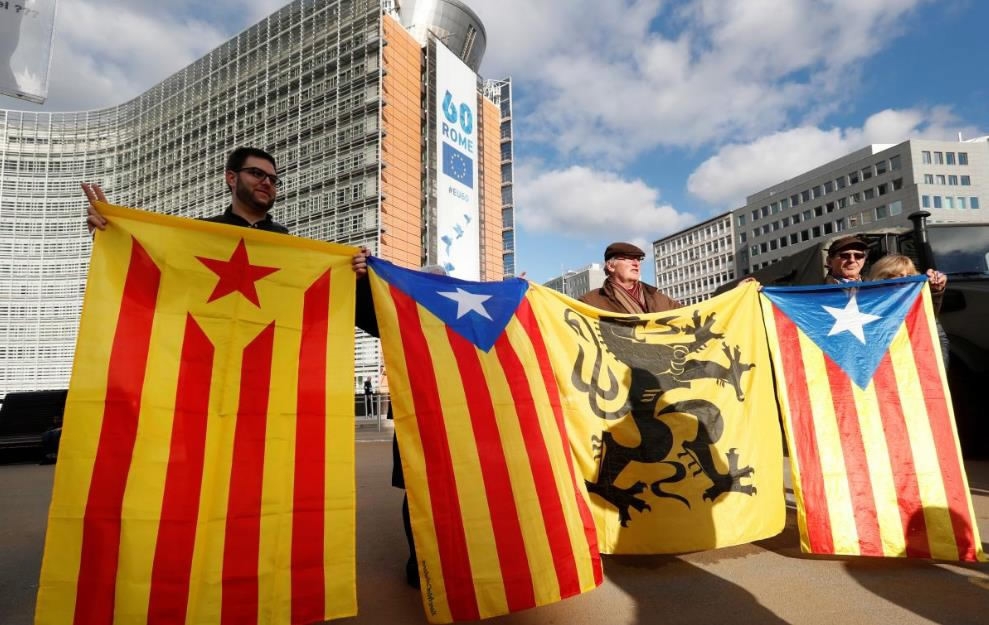
Politics
09:30, 08-Nov-2017
Ousted Catalan leader accuses EU of taking sides with Spanish PM
CGTN

Catalonia's sacked leader on Tuesday slammed the European Union for backing Spanish Prime Minister Mariano Rajoy in his bid to quash secession, after calling on pro-independence parties to unite for next month's regional election.
"Will you accept the result of the Catalan referendum or will you continue to help Mr Rajoy in his coup d'etat?" Carles Puigdemont, who was dismissed by Madrid last month after the Catalan parliament declared unilateral independence, said in Brussels.

Former Catalan leader Carles Puigdemont gestures while delivering a speech to Catalan mayors in Brussels, November 7, 2017. /Reuters Photo
Former Catalan leader Carles Puigdemont gestures while delivering a speech to Catalan mayors in Brussels, November 7, 2017. /Reuters Photo
Puigdemont, who faces extradition on charges of rebellion and sedition, was speaking at an event attended by some 200 pro-independence Catalan mayors who had flown there for support.
The secession crisis began when Catalan leaders held an independence referendum on October 1 despite a court ban. Regional authorities said 90 percent opted to break away from Spain, though less than half of eligible voters turned out in a region deeply divided over independence.
The unregulated referendum was also repressed by police trying to stop people from voting.
Then on October 27, Madrid took direct control of the once semi-autonomous region after the Catalan parliament declared independence, dismissed regional leaders and called elections for December 21.
Earlier on Tuesday, Puigdemont called for pro-independence parties to unite for the vote. "We have no option but to go all in together," he told Catalan radio.
Cracks in independence front?
The crisis has deeply divided Catalans and seen more than 2,000 businesses move their headquarters out of the wealthy region, home to 7.5 million people.

Former Catalan leader Carles Puigdemont and former cabinet members Antoni Comin, Clara Ponsati, Meritxell Serret and Luis Puig Gordi stand during a meeting with Catalan mayors in Brussels, November 7, 2017. /Reuters Photo
Former Catalan leader Carles Puigdemont and former cabinet members Antoni Comin, Clara Ponsati, Meritxell Serret and Luis Puig Gordi stand during a meeting with Catalan mayors in Brussels, November 7, 2017. /Reuters Photo
Puigdemont has said he is prepared to run as a candidate on December 21, but it is far from clear whether or not he will even be in the country by then.
In the region's last elections in 2015, the "Together For Yes" coalition – composed of left-wing party ERC and Puigdemont's conservative PDeCAT – delivered a majority with 72 seats out of the 135-seat parliament, aided by their smaller ally, the far-left CUP party.
Although parties still have until later this month to officially register on electoral lists, politicians in Madrid will watch closely for any possible cracks in the pro-independence front.
'Wave of repression'
Although the separatists won a majority of seats in 2015, they captured less than half of votes cast, and polls show Catalans remain split over independence.
Spain's deepest political crisis in decades has reignited fears over its ability to recover from the financial crisis and exposed officials in Madrid to allegations of heavy handedness in their response.
A court last week ruled that eight Catalan ministers deposed by Spain after declaring independence be remanded in custody pending investigation into charges of rebellion, sedition and misuse of public funds.
Puigdemont himself and four former ministers are due to appear next week in front of a Belgian judge after Spain issued a European arrest warrant and demanded their extradition.
The crisis has caused concern in the EU, already reeling from Britain's shock decision to exit the bloc.
Catalonia a big concern
The deposed leader on Tuesday claimed he had fled Spain in order to avoid a harsh crackdown from Madrid.
"I'm absolutely convinced that the Spanish state was preparing a harsh wave of repression and violence for which we would have all been held responsible," he told Catalan radio, without elaborating.

A group of demonstrators with Catalan and Flemish separatist flags gather outside the EU Commission headquarters in Brussels, November 7, 2017. /Reuters Photo
A group of demonstrators with Catalan and Flemish separatist flags gather outside the EU Commission headquarters in Brussels, November 7, 2017. /Reuters Photo
The Catalan independence crisis is now Spaniards' second largest concern after the country's rampant unemployment, according to a poll published Tuesday.
A survey by the Center of Sociological Studies in Madrid found that 29 percent of respondents said they were now more worried over the fate of the region than by corruption (28.3 percent).
There had been fears that Madrid's imposition of direct rule on Catalonia could provoke widespread unrest in the region – which accounts for a fifth of national GDP. But this has yet to materialize.
Still, pro-independence groups have held several large protests calling for the release of former ministers and a general strike has been called for Wednesday.
7971km
Source(s): AFP

SITEMAP
Copyright © 2018 CGTN. Beijing ICP prepared NO.16065310-3
Copyright © 2018 CGTN. Beijing ICP prepared NO.16065310-3